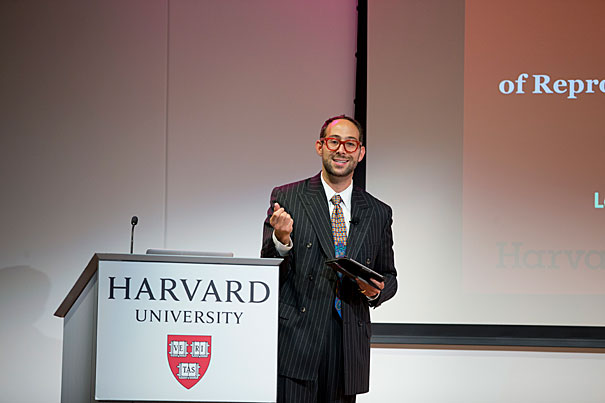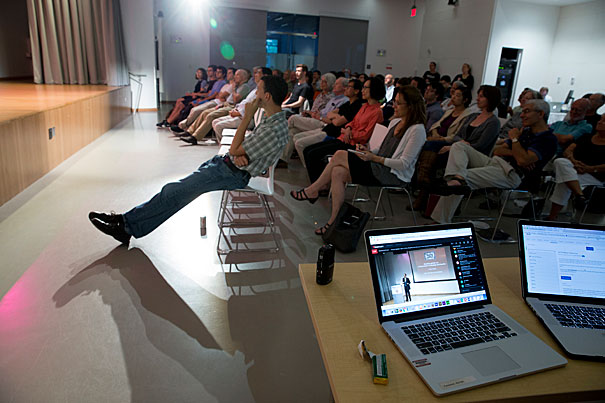
Harvard Law School Professor Glenn Cohen spoke at the Harvard Ed Portal as part of the Faculty Speaker Series.
Rose Lincoln/Harvard Staff Photographer
Professor offers basics of bioethics and the law in 90 minutes
Harvard expert breaks down complex topic for Ed Portal and online audience
Bioethics, the law, and how they pertain to health information technologies, reproduction, and research have raised questions, and often hackles, since humans began to debate the boundaries of life. Should physicians assist in the death of a patient? Or create embryos and destroy them in the service of creating stem cell lines? Under what circumstances should the state be allowed to involuntarily hospitalize individuals, and what procedures are in place to protect the rights of those individuals?
Harvard Law School Professor Glenn Cohen brought those questions, and an approach to consider them, to an interactive, one-night class at the Harvard Ed Portal that delved into the intricacies surrounding the legal, medical, and ethical aspects of bioethics.
The Sept. 13 lecture, attended by nearly 60 people and audited online by more than 100 viewers from all over the world, was held in conjunction with Cohen’s HarvardX course, “Bioethics: The Law, Medicine, and Ethics of Reproductive Technologies and Genetics.”
Bioethics is about testing our intuitions, examining a series of cases that are alike and unalike and then exploring whether the variations affirm or challenge our gut feelings, said Cohen, the faculty director of the Petrie-Flom Center for Health Law Policy, Biotechnology and Bioethics.
“This is what law professors do, take the premise of what something should be and nudge you toward doubt and self-doubt,” he said. “Especially when educating with material that is both fascinating and terrifying. There is a certain moral panic when thinking about making these decisions.”

Mark Keating, a student from Brooklyn who has been taking Cohen’s online course, traveled to Allston to attend the lecture in person. “The first week of the online class was fascinating, looking at odd experiments and tweaking this or that to see if our intuition changes,” he said. “It fostered an environment of debate and discussion for me even outside of the class.”
The discussion included what Cohen referred to as “patients and passports,” or medical travel. Should parents be allowed to take their children abroad for things that are illegal at home, such as abortion? Should laws be extraterritorial? How should we allocate who gets priority on organ transplant waiting lists? What is morally significant regarding intuition — in other words, what is the right thing to do?
Even the obscure, such as who owns the hair customers leave at a barber shop or the blood drawn in a lab, are the types of questions that are examined every day by hospital ethics committees, research ethic boards, classrooms, and courtrooms. The answers, however, will only come through the process of pushing intuitive thinking and nudging the boundaries of discussion across society, Cohen said.
Audience members had plenty to say through the 90-minute lecture.
“This is a field growing in importance and stature,” said Jamie Susskind of Cambridge, Mass., a fellow at the Berkman Klein Center who is writing a book on the future of political ideas.
“When you are dealing with the law you want a yes or no answer so you can have a precedent, but in this case you almost can’t be wrong,” said Carmen Altes of Watertown. “There is no direct answer, so there is no wrong way to arrive at a conclusion.”
Brad Bellows, also a Cambridge resident, said the lecture let the community be part of a Harvard Law School class for one night.
“We don’t do enough of these kinds of events. Anything that gets people thinking is a good thing,” said Bellows. “This Allston setting is an important part of Harvard that is often overlooked.”
“This is a wonderful opportunity to both experience and have a discussion with Professor Glenn Cohen,” said Robert A. Lue, faculty director of the Harvard Ed Portal and faculty director of HarvardX. “Glenn is something of a superstar at the Harvard Law School and clearly has a remarkable breadth of intellectual interests and projects.”
The takeaways for the evening were beneficial to both teacher and students. Cohen said he liked seeing how he could adapt his course to the Ed Portal setting and how thoughtful people were in their participation.
“I find this endlessly fascinating,” said Cohen. “I hope I’ve at least entertained you, if not educated you.”
The lecture was one of the Faculty Speaker Series offered by the Harvard Ed Portal as part of its educational initiative stemming from HarvardX, an online learning resource offering high-quality programs in many disciplines.




